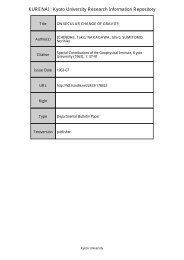THE HISTORICAL CONSCIOUSNESS OF GEORG LUKACS
THE HISTORICAL CONSCIOUSNESS OF GEORG LUKACS
THE HISTORICAL CONSCIOUSNESS OF GEORG LUKACS
You also want an ePaper? Increase the reach of your titles
YUMPU automatically turns print PDFs into web optimized ePapers that Google loves.
6 T. HIRAI<br />
resulting problem it raises these days. The view in his later days, which had once<br />
been destined to be condemned by Lukacs himself, is conversely to be judged<br />
now by his early view in turn. The development of thought, be it accompanied<br />
by the increase of knowledge, can not but often give up its substantially original<br />
element without raising its previous content. The dialectics in History and Class<br />
Consciousness, though idealistic, are of such a nature as to create the future by<br />
putting the historical problems of proletarian revolution into practice. What<br />
was required here in those days was the most thoroughgoing criticism of capitalist<br />
society and breaking free of the past. Contrarily, the dialectics in his later days<br />
have been characterized by a very weakened attitude toward the future and are<br />
found to be of such a nature as to return to the bourgeois rationalism he criticized<br />
in his early days. When dialectics lose the energy of the subject to create the future,<br />
they sink down to the level of the past, i.e. bourgeois rationalism in the case of Lukacs,<br />
and above all the principle of criticism of the ready-made system will be very<br />
greatly weakened. Needless to say, it will turn out to be mechanical criticism,<br />
unless the days when Lukacs used to live and the change in the environment -<br />
the change from capitalism to socialism --should be taken into consideration:<br />
(the problem of dialectics in the socialist system requires to be discussed separately).<br />
Nevertheless, when viewed from his dialectic itself, that is the way of thinking in<br />
his later life, it will fall into the "static attitude" with which Lukacs had once<br />
criticized bourgeois ideology. It is solely because of this reason, when History and<br />
Class Consciousness is compared with "The Destruction of Reason", that I am so<br />
deeply impressed with the impulse of the spiritual life in the former.<br />
Besides when the practicability -- subjectivity --of clearing the road to<br />
the future is weakened, dialectics lose their sensitive element and become centralized.<br />
Practicability always demands impulsiveness. In History and Class Consciousness<br />
the entirety of the proletarian personality is conceived -- whatever it<br />
might be made conscious. Capitalist society would be judged as a partialisation<br />
of this entirety of personality. Indeed, it would not mean that the view<br />
of this entirety could no longer be found in the writings of his later life,<br />
because if so, it would mean giving up dialectics. Nevertheless is there not some<br />
inclination for this partialisation to be isolated, irrespective of the entirety? Was<br />
this not the very point, which Lukacs had once criticized social democracy for? I<br />
think that it does correspond to the way Lukacs has grasped dialectics as rationalism,<br />
but I would adumbrate no more here than the mere presentation of the<br />
problem to be solved l3). We have a firm footing on the road to socialism.<br />
13) Ibid., p. 43 .. about the relation between rationalism and anti-rationalism and the change of<br />
thought.
















